- Home
- Dusty Richards
Blue Roan Colt
Blue Roan Colt Read online
Contents
Blue Roan Colt
Also by Dusty Richards
Copyright
Foreword
Dedication
Chapter One
Chapter Two
Chapter Three
Chapter Four
Chapter Five
Chapter Six
Chapter Seven
Chapter Eight
Chapter Nine
Chapter Ten
Chapter Eleven
Chapter Twelve
Chapter Thirteen
Chapter Fourteen
Chapter Fifteen
Chapter Sixteen
About the Author
Zekial
Exclusive Excerpt of Zekial
Also from Tiree Press
Also from Oghma Creative Media
The Byrnes Family Ranch Series
Texas Blood Feud • Between Hell and Texas • Ambush Valley
Blood on the Verde River • Brothers in Blood • A Good Day to Kill
Arizona Territory • Pray for the Dead • Deadly is the Night
Valley of Bones • Sharpshooter • Rage for Vengeance
The O’Malleys of Texas Series
The O’Malleys of Texas • Dead Aim
The Brandiron Series
A Bride for Gil • The Mustanger and the Lady
The Cherokee Strip • Gold in the Sun
The Texas Badge Series
The Texas Badge
Other Works
The Natural • Waltzing With Tumbleweeds • Zekial
Tiree Press
An Imprint of Oghma Creative Media, Inc.
2401 Beth Lane, Bentonville, Arkansas 72712
www.oghmacreative.com
Copyright © 2019 by Dusty Richards
We are a strong supporter of copyright. Copyright represents creativity, diversity, and free speech, and provides the very foundation from which culture is built. We appreciate you buying the authorized edition of this book and for complying with applicable copyright laws by not reproducing, scanning, or distributing any part of it in any form without permission. Thank you for supporting our writers and allowing us to continue publishing their books.
Library of Congress Cataloging-in-Publication Data
Names: Richards, Dusty, author.
Title: Blue Roan Colt/Dusty Richards.
Description: Second Edition. | Bentonville: Tiree, 2019.
Identifiers: LCCN: 2018961298 | ISBN: 978-1-63373-274-2 (hardcover) |
ISBN: 978-1-63373-275-9 (trade paperback) | ISBN: 978-1-63373-276-6 (eBook)
Subjects: BISAC: FICTION/Westerns | FICTION//Historical /World War II |
FICTION/Historical
LC record available at: https://lccn.loc.gov/2018961298
Tiree Press eBook edition June, 2019
Cover Design & eBook formatting by Casey W. Cowan
Editing by Velda Brotherton & Dennis Doty
This book is a work of historical fiction. Any references to historical events, real people, or real places are used fictitiously. Other names, characters, places, and events are products of the author’s imagination, and any resemblance to actual events or places or person, living or dead, is entirely coincidental.
FOREWORD
FOR THIRTY YEARS, DUSTY RICHARDS and I enjoyed a special friendship. We met as struggling writers and found in on another a kindred spirit, both determined to learn our craft. In essence, you might say I was weaned on writing westerns beside the man who would go on to become one of the most successful and prolific writers of the genre. Dusty wrote and published nearly 200 Westerns during his career under his own name and various pseudonyms. He won three Western Writers of America Spur Awards, multiple Will Rogers Medallions, a Western Heritage Award, and many other honors, and one of his later novels—The Mustanger and the Lady—was adapted into a full-length motion picture released in 2017. He had the kind of success most writers can only dream about, and I learned more from him than I can possibly describe here.
The most important thing I learned from Dusty, though, was to share my hard-won knowledge freely. Possessed of possibly the world’s most generous spirit, he helped countless other struggling writers over the course of his long career, teaching them the ins and outs of chapters and plots, marking up manuscripts, even shoving some of them—like me—into a room with a publisher and barring the door behind. He enjoyed giving others a hand up, and was the rare kind of person that was genuinely happy to see another succeed. I couldn’t be more privileged than to have known him and spent so many years helping writers beside him.
To that end, I’m so happy to have been chosen to complete the rewrites and edits for Blue Roan Colt, one of Dusty’s most touching books. He was working on it himself before the tragic car accident that claimed his life and that of his loving wife, Pat, last year, and his loyal readers will no doubt enjoy this, probably the latest book he had hands on before he was taken from us. I spent several weeks completing what he began, making this book one of his finest, and I’m honored to have been included as having contributed to its completion. Blue Roan Colt is about a World War II veteran who pursues his dream of owning a ranch and healing the scars left behind by battle. The story takes the reader through a west only Dusty could portray and tells the heart-wrenching story of the desire, hope, and faith of one man determined to live out his dream despite all obstacles.
Dusty was one of the greatest storytellers I’ve ever met, and his knowledge of the west and its history was infinite. His books will outlive generations. My profound thanks to Casey Cowan, Oghma Creative Media, and Galway Press for considering me for the continuation of Dusty’s great legacy.
—Velda Brotherton
Winslow, Arkansas
January 27, 2019
This one’s for Pam.
CHAPTER ONE
THE WAR DUMPED MARK BACK in New Jersey at Camp Call. All he wanted was to ride a horse to the end of the world and back, but that dream would probably stay just that—a dream, him without a home to go to and all.
The Depression before the damn war caused his grandfather to lose the family’s ranch up by Congress where he grew up. He was supposed to inherit the P Bar 9, but now it belonged to some New York broker who wore Gene Autry clothes around the place. He turned it into nothing more than a dude ranch.
Any rodeoing activity would sure be a luxury in his life. Maybe he could manage a ranch for someone. Employment of some sort would have to happen, with his wife Shelia waiting in Phoenix for him. As for that ride cross-country, he’d have to kiss that notion goodbye. Only good thing for sure—he was going home as soon as they got his discharge papers worked up.
It had been four years since he’d marched off to that theater of hell. He never had another chance to be a husband after he climbed on that first bus and went to Fort Leonard Wood in Missouri. After basic, he took a train to New York and went onboard a passenger boat commandeered to carry GI Joes to England.
He hated ships, hated oceans. It was a wonder they didn’t get torpedoed going over there. All through that long separation, he missed his wife like other soldiers missed their homes and families. Never, in that span of four plus years, had he ever so much as looked at another woman. Well, maybe looked but that was danged sure all. There were lots of female camp followers in England, plenty of grateful women in France. A mass of widows and Rosie the Riveter kind of gals who sat on stools in New Jersey bars. None were for him. He had a downright pretty wife at home.
After four winters of freezing his ass off in Europe, he was headed back to Phoenix at last, where it barely frosted even in winter.
Surely, he could find a real cattle place that needed him. What with all these soldiers returning to the U.S. of A. there wouldn’t b
e many jobs open for very long. Veterans, they called them. When Congress got done, they were going to get a GI Bill of Rights to go to college and to buy a house. He’d figured a lot of that talk was just bullshit. He simply wanted to be home.
Only partway there, he dropped in to see Sergeant Nelson, the noncom working on his discharge papers.
The red-faced older guy glanced up. “Hey, cowboy. If I coulda got you a bus ticket, I’da sent you home. But they’re all booked full.”
“Listen, Sarge. If I can get out, I can get my own ass home to Arizona.”
“I wondered about that. I can get you fifty bucks cash and your discharge papers tomorrow.”
He put his service cap back on. “I’m ready. What time do I need to be here?”
“Two p.m. Two-thirty you’ll be free.”
Hard to believe he could put the army and that war behind him. He grinned at the noncom. “If you weren’t so damn ugly, I’d kiss you.”
“No, thanks. You got a wife?”
“Sure. In Phoenix. Shelia’s her name. She’ll be excited.”
“Got any kids?”
He shook his head.
“Well, in a few days, you’ll be home and can start working on a family.”
“By damn, I’ll do that.”
The next day, with discharge papers in his hot hands, he left the base about three p.m. and caught a ride across the Hudson River, the driver leaving him in downtown. Busy dang place—noisy too—but he flagged down a cab and, for forty cents, went to the open market trucking district. In the right place at last, he searched for a California trucking firm rig. Inside of an hour, he found an outfit from Bakersfield.
The driver was a balding guy smoking a cigar. Sure enough, he was Italian.
Mark didn’t care one way or the other. “Hey, I need to get to Arizona. Are you heading back west?”
“You bet. Can you drive a rig?”
“Been driving army rigs for four years. Drove bob trucks since I was twelve.”
“We’ll split the driving. I’ll buy the eats. What’s your name, soldier boy?”
“Mark Shaw.”
Vincenzo was the man’s first name. He knew that much when they climbed in the cab and headed west to Indiana to pick up a load of pumpkins. Two days later they loaded umpteen hundreds of the orange globes into the trailer and headed for Saint Louis and the Route 66 highway to California.
The new road was only two lanes and went through every town along the way. Vinnie was what he called the old man who knew every place across the country that either served good food or had sharp looking waitresses.
Part of 66 wasn’t even paved yet. Construction had been shut off by the war. He found driving Vinnie’s old truck as tough on the rutted roadway as an army rig. They had a few flats to change by breaking the casing down and patching the tube. Then they’d hand pump them up again beside the road.
At Flagstaff, where he planned to part with the old man, Vinnie bought him a large chicken-fried steak dinner. They shook hands, ready to say goodbye.
“I’m-ah damn sure sorry to part witcha,” the crusty Italian said. “You the best tire pumper I ever hauled. You want to drive a truck cross-country, you call Bakersfield and ask for Tony’s Trucking. Dem phone operators all know him. He messes around wid ’em. He’ll hire you. I’ll tell him all about you.”
“Say, you’re the straightest shooter I ever met. But I’m going back to Phoenix to find me a ranch manager’s job, and the only trucking I plan to do is hauling cattle to market.”
Vinnie climbed into his truck. “Yeah, yeah. I’ll go watch a Gene Autry film at the movie theater and say there goes my buddy Mark Shaw.”
—
DURING THE LAST LEG OF his trip, an old man in a Model A pickup hauled him down through Oak Creek Canyon to Camp Verde. The man’s name was Rough Cravens. He owned a ranch east of there. It was a wonder they survived the trip, considering his driving on the hairpin curves with the sorry brakes on the loaded pickup.
The near wrecks never bothered Cravens, but Mark spread his hands on the dash every once in a while to save himself from the next expected crash. In places, the old man fought the steering wheel and raised his hatchet ass off the seat to apply the dull brakes as hard as he could. Down in the canyon, the roadway flattened out and followed a clear creek that reflected the cottonwoods in their golden fall foliage. At last, he could relax. His heart back to normal, he talked with the driver about a ranch job for him.
Cravens knew of a couple of neighbor ranchers who wanted some help. Eager to hear more, Mark took down their names on a small pad with a stub of a pencil. “Any of them have a house for their cowboy? I have a wife in Phoenix who’s waiting for me.”
“Waiting? How long you been gone?”
“Four long damn years.”
“Most women around here done found themselves a new one to rut with.”
Mark shook his head. “No, I wrote her regular. She’s had hell getting by, but she’ll be there waiting for me.”
Cravens simply nodded. He heard him, but he never looked convinced of what he’d assured him about Shelia.
All the way down the valley, the aroma of the creosote in his nose was better than Flagstaff’s piney smells. Heading home was the most important part of the deal—he’d soon be in Shelia’s arms. Whew, that had been a long time for a man to have been without his wife.
“I know about a ranch up in my country. The heirs want to sell it. Cattle ain’t been worked since before the war. Mavericks all over the place. It’s a mess. But none of us had any help and taking care of what we had was more than we could do.”
“What do they call it?”
“Hancock Ranch. It’s back up on the Verde and Bloody Basin country. A man could carve a good ranch out of it if he was tough enough.”
“What do they want for it?”
“Oh, a couple thousand would suit them, I believe. None of them heirs live around here.”
A lot more money than he had in his pocket, for damn sure. But perhaps he could find a moneyman to put up the dough. Would the VA consider a ranch a home? He sure would. Just to be sure he’d remember that name, he scribbled Hancock Ranch down on his pad.
Parting ways with the old man at the base of the mountain, he shook his hand and thanked him. After telling him he’d see him again sometime, he stepped out into the bright afternoon. The Arizona warmth was one of the things he missed the most in Europe. The sun came out over there, but even in summer time, his bones stayed cold. He had real sun shining on him while he ran to catch up with an older De Soto. The driver offered him a ride to Phoenix. He said his name was Dillon and shook hands like a dead fish.
Mark tossed his war bag in the trunk before he got in. Several canvas water bags hung all over the car and gallon jugs of water sat behind the front seat. Obviously, Dillon was ready for the narrow road that climbed to the top of the mountain.
The engine roared and the man let out the clutch. They were mountaintop bound. He kept looking at his heat gauge. Gravel crunched under the tires on the narrow roadway and the stench of the engine filled the air.
“How are we doing?”
“Oh, she ain’t in the red yet, but she’s getting close. Don’t worry. I’ve got plenty of water. Last time she boiled over going up this mountain.”
“Should we stop and cool her off?”
“Ain’t no place to do that here.”
That was a pure fact. The gurgling of the radiator soon told them they were about as far as they could go.
After nudging the car against the bluff side, Dillon braked and shut off the key. “You get out, get rocks, and block all the wheels. I’ll hold my foot hard on the brake. We’ll have to let her cool awhile.”
Mark agreed and squeezed out his side. Rocks lay everywhere. Finding the size he wanted, he soon had the tires well blocked. Dillon huffed like he’d done all the work and complained about getting a cramp in his leg holding the pedal down.
“You’re fine now.”
How in the world would the next car coming up the hill ever pass them on the narrow ledge?
Soon, he and Dillon found themselves coaxing the driver of an older Ford coupe past the disabled De Soto. He would have sworn that half of the man’s outside tire treads hung out over the cliff, but he kept at it, screwing his bearded face up one or two times when he skidded close to the edge. Mark sucked in his breath, scared he’d have to stand there helpless and watch the old Ford tumble right down to the bottom, taking the fella with it. But he made it, good and safe. After thanking them, he waved and drove on.
Dillon kept laying his hand real fast on the hood, shaking his head and muttering, “We‘re fine. We have plenty of water.”
The car finally cooled. After refilling the radiator, the old man pulled out for the crest. She boiled over again about fifty feet from the top, but another half-hour of sitting in the road ditch and she had cooled down. They headed, at long last, for Prescott. All the locals called it Preskit. It was near evening when Dillon steered the car into the city and stopped so they could eat supper in the famous Palace Bar on Whiskey Row. After the great meal, he headed down the mountain with the sun setting, over towards Wickenburg.
In places, Mark worried the De Soto’s grinding brakes might send them off the steep curvy mountain road, but before midnight the old car carried them into Phoenix. Dillon drove to the former tourist court on east Van Buren where Shelia had rented them a place. She wrote him that the court owner had changed the cabins into small apartments. The tourist business had been slow in Phoenix because of gas rationing. No one could travel much during the war.
He got out and thanked Dillon. Nervous and excited, he slung the war bag onto his shoulder, looking at the open door of the first run-down cabin. A woman stood smoking a cigarette with a hand on her hip.

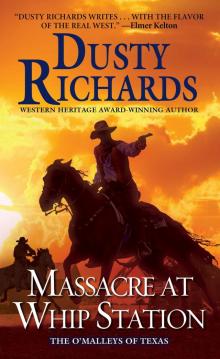 Massacre at Whip Station
Massacre at Whip Station Blue Roan Colt
Blue Roan Colt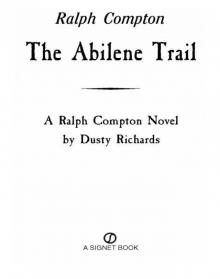 The Abilene Trail
The Abilene Trail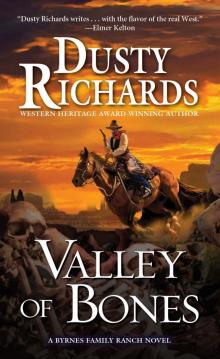 Valley of Bones
Valley of Bones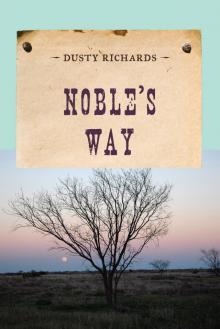 Noble's Way
Noble's Way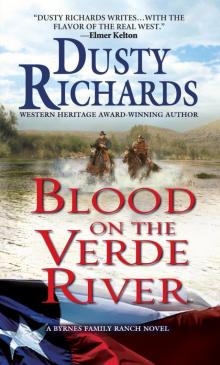 Blood on the Verde River
Blood on the Verde River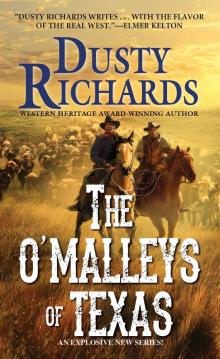 The O'Malleys of Texas
The O'Malleys of Texas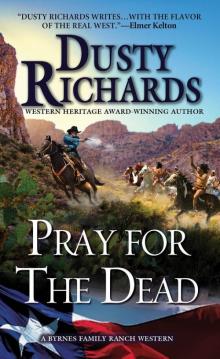 Pray for the Dead
Pray for the Dead Arizona Territory
Arizona Territory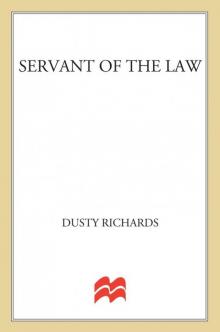 Servant of the Law
Servant of the Law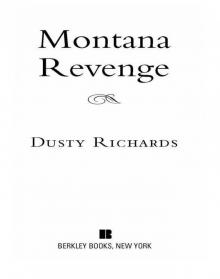 Montana Revenge
Montana Revenge The Sundown Chaser
The Sundown Chaser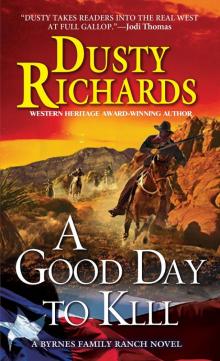 A Good Day To Kill
A Good Day To Kill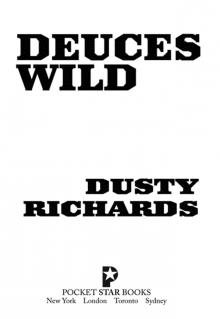 Deuces Wild
Deuces Wild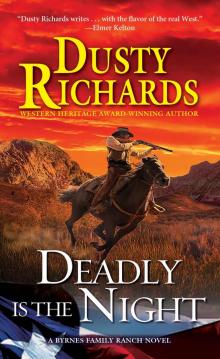 Deadly Is the Night
Deadly Is the Night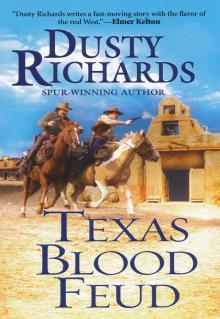 Texas Blood Feud
Texas Blood Feud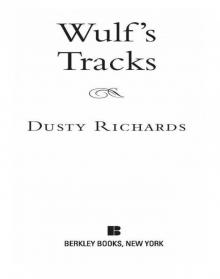 Wulf's Tracks
Wulf's Tracks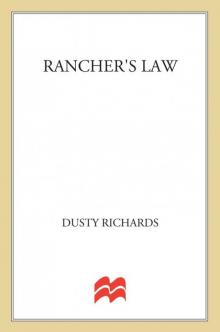 Rancher's Law
Rancher's Law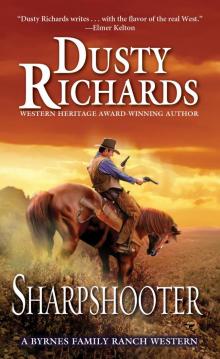 Sharpshooter
Sharpshooter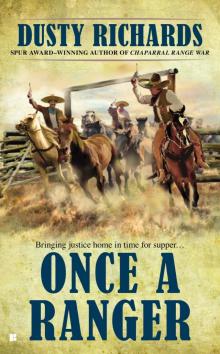 Once a Ranger
Once a Ranger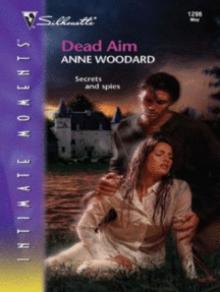 Dead Aim
Dead Aim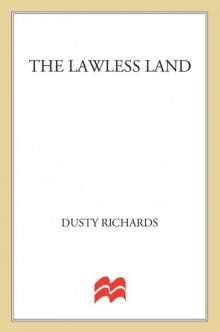 Lawless Land
Lawless Land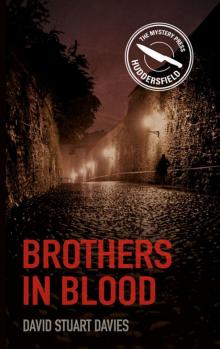 Brothers in Blood
Brothers in Blood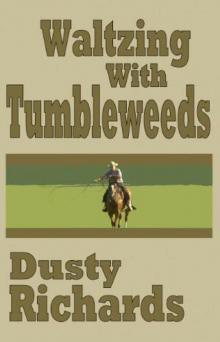 Waltzing With Tumbleweeds
Waltzing With Tumbleweeds